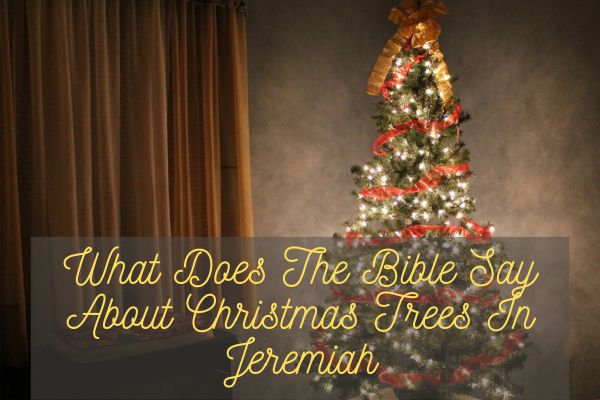Table of Contents Show
Welcome to our blog post where we explore the intriguing topic of what the Bible says about Christmas trees in Jeremiah. As the holiday season approaches, many of us engage in the beloved tradition of decorating Christmas trees.
But have you ever wondered if there is any biblical guidance regarding this practice? In this article, we will look into the origins and symbolism of Christmas trees, examine what the bible says about Christmas trees In Jeremiah, and explore different interpretations among Christians. Join us as we navigate this intriguing topic and shed light on the biblical perspective of Christmas trees.
What Does The Bible Say About Christmas Trees In Jeremiah?
The holiday season is often marked by various traditions, and one of the most cherished is decorating Christmas trees. However, as with any religious topic, people may wonder if there is any biblical guidance regarding this practice.
Origins and Symbolism of Christmas Trees
Before looking into the biblical perspective, it’s helpful to understand the origins and symbolism of Christmas trees. The tradition of decorating trees during the winter season has ancient roots, with early civilizations believing that evergreen trees symbolized fertility, rebirth, and eternal life.
Biblical References to Trees and Their Symbolism
Throughout the Bible, trees are often used as symbols to convey various meanings. In the Old Testament, trees are associated with life, wisdom, and blessings. For example, the tree of life in the Garden of Eden represented immortality and communion with God.
The Bible’s Silence on Christmas Trees
While the Bible does mention trees and their symbolism, it does not explicitly address the use of Christmas trees. The absence of direct references to this particular practice leads to differing interpretations among Christians.
Understanding Jeremiah and Context
Jeremiah is a prophetic book in the Old Testament, and it contains messages from God for the Israelites during a time of judgment and exile. To understand any biblical passage, it’s crucial to consider the historical and cultural context in which it was written.
The Historical Background of Jeremiah’s Time
During Jeremiah’s time, the Israelites were engaged in idolatrous practices, including the worship of trees and other pagan rituals. These practices were explicitly condemned by God, as they drew the people away from true worship.
Examining Relevant Verses in Jeremiah
There are a couple of verses in Jeremiah that some people associate with the modern tradition of Christmas trees. Jeremiah 10:1-5 mentions the cutting down of trees, shaping them with a chisel, and adorning them with silver and gold.
Interpreting the Verses in Context
Interpreting biblical passages requires careful consideration of their context. In the case of Jeremiah 10:1-5, scholars generally agree that the passage is not referring to Christmas trees but rather to the creation of idols for pagan worship.
The Worship of Trees in Pagan Practices
During the time of Jeremiah, the worship of trees and the creation of idols from them were prevalent pagan practices. The passage in Jeremiah is a warning against such idolatrous activities and not a direct commentary on the use of Christmas trees.
Different Interpretations of Scripture
Within Christianity, there are various interpretations of Scripture, including the passages in Jeremiah. Some Christians believe that Christmas trees are harmless symbols of joy and celebration, while others prefer to avoid them due to their historical association with pagan customs.
Historical Christian Perspectives on Christmas Trees
Over time, Christians have developed different perspectives on the use of Christmas trees. Some view them as a way to celebrate the birth of Jesus and bring joy to the season, while others choose to focus solely on the religious aspects of Christmas without incorporating tree decorations.
Personal Beliefs and Cultural Practices
Ultimately, the decision to have a Christmas tree is a personal one influenced by individual beliefs and cultural practices. Some Christians find deep meaning and spirituality in the tradition, while others may choose alternative ways to celebrate the holiday season.
The Freedom of Individual Interpretation
The Bible allows for a range of interpretations on matters that are not explicitly addressed. It affirms the freedom of individual believers to make informed choices based on their understanding of Scripture and personal convictions.
Conclusion
What the Bible says about Christmas trees in Jeremiah elicits varying interpretations among Christians. While the Bible does not directly address the use of Christmas trees, it provides valuable insights into the symbolism of trees and warns against idolatrous practices.
Ultimately, the decision to have a Christmas tree is a personal one, guided by individual beliefs and cultural traditions. As we celebrate the holiday season, let us remember the importance of love, joy, and the true meaning of Christmas.
Whether you choose to have a Christmas tree or not, may your celebrations be filled with warmth, togetherness, and a deep connection to your faith.
FAQs
1. Are Christmas trees mentioned in the Bible?
No, Christmas trees are not specifically mentioned in the Bible. The Bible does mention trees and their symbolism but does not address the specific practice of decorating trees during the holiday season.
2. Should Christians have Christmas trees?
Whether Christians choose to have Christmas trees or not is a matter of personal conviction and cultural practice. There is no clear biblical mandate either for or against having Christmas trees. It is ultimately up to individual believers to decide how to best honor and celebrate the holiday season.
How did the tradition of Christmas trees originate?
The tradition of Christmas trees has ancient roots and evolved. Evergreen trees have long been associated with life and rebirth, and various cultures incorporated them into their winter celebrations. The modern tradition of decorating Christmas trees became popular in the 16th century in Germany and spread to other parts of the world over time.








